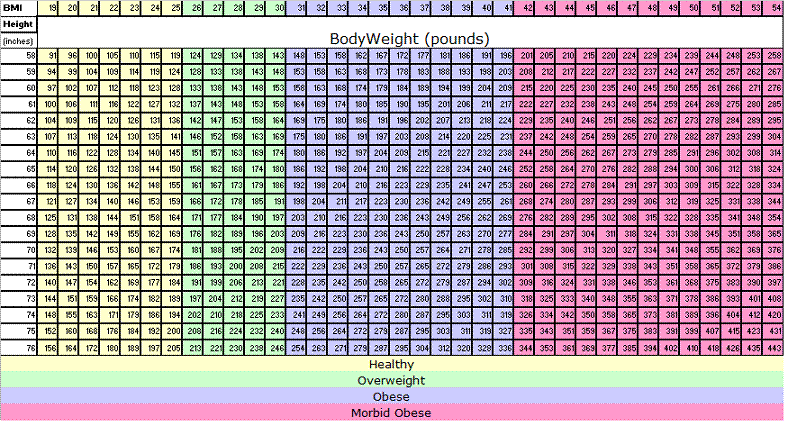Yesterday, one of my Facebook friends who owns a chain of weight-loss and fitness centers posted an Ideal Body Weight chart on his page and simply asked the question, “What do you think of this?” Some pointed out that muscle mass should also be a consideration—a fair argument. Some gave it a light-hearted reply, “I’m 4 inches too short!” Several confessed to being overweight, but without any indication they planned to do anything about it: “I’m obese! Ha!!”
The overwhelming majority of comments were negative, however. They ranged from “I don’t know that I agree” to downright angry, “It’s crap! No wonder people are having body image issues.” Many went on to describe how they’d look like starvation victims, how they know they wouldn’t feel good at that weight, etc.
Because everyone can see profile pictures of the person posting, I did a little non-scientific survey. In my non-professional but also not totally naïve opinion, most of those posting negative comments really would look and feel better at a lower weight. Plus, maintaining a healthy weight has been shown time and time again to have long-term health benefits.
With so many obvious and proven benefits, why would anyone argue against trying to achieve their ideal body weight? Instead of accepting the feedback and using it as motivation to get a better life, most people joked about it, shrugged it off, justified their current unhealthy state, or got angry at anything or anyone that suggested an alternative.
I know where my friend’s heart is on this issue, and he truly wants good things for everyone. In fact, he built the culture of his entire business organization to love on and encourage everyone who comes through the doors of his fitness centers. Every quarter, they throw a big party to recognize and celebrate the successes of those who sign up for their program.
And the successes are plentiful. His website and social media pages are filled with hundreds of pictures and stories of people who have had their lives transformed. I attended one of those quarterly parties where I witnessed dozens of people stand with tears streaming down their faces talking about the self-created hell they lived in before, and the freedom they now found from living a healthier lifestyle and at a more ideal weight.
What is the difference between these two groups—one that has received the rewards of change, and the other that is in denial about their current condition and the benefits of seeking something better? The only difference is one made a decision to get better, while the other chooses to lie to themselves.
The difference is one has received the rewards of change and the other is in denial.
Less than twenty-four hours and 164 comments later, my friend took the post down. I’m not sure if he meant it as an experiment, but it sure could have been. It shows that we as humans can work pretty hard at ignoring, justifying, or resisting changes that would truly be in our best interest. Those who defy that temptation and use feedback as motivation to get better, however, are rewarded with all of the benefits that come from growth and positive change.
The same principles are true for those who cause harm to their partners. Many will remain in denial, minimizing or justifying their actions. It’s our human nature to defend who we are, even when someone on the outside can easily see our self-deceit, and even when it’s not in our best interest to do so. I know, because I did this for years.
It’s our human nature to defend who we are, even when it’s not in our best interest to do so.
Others, on the other hand, will fight against that tendency for self-protection and look at themselves objectively. When they see that change would make their lives better, they sign up, show up, and do the work necessary to achieve the results they’re seeking. This is the best version of accountability–accountability to the person we want to be. It turns out that kind of accountability feels good. I’m glad I finally made this choice.
Others sign up, show up, and do the work necessary to achieve the results they’re seeking.
Like my friend’s chain of fitness centers, the Ananias Foundation genuinely cares about those who come to us for help. We want a better life for you. We won’t tell you that you’re fine just the way you are—that wouldn’t be the loving thing to do. You’ll have to do the work, but we’re here to provide resources and encouragement for everyone on this journey of transformation.
So which kind of person are you? Change is possible.


Recent Comments